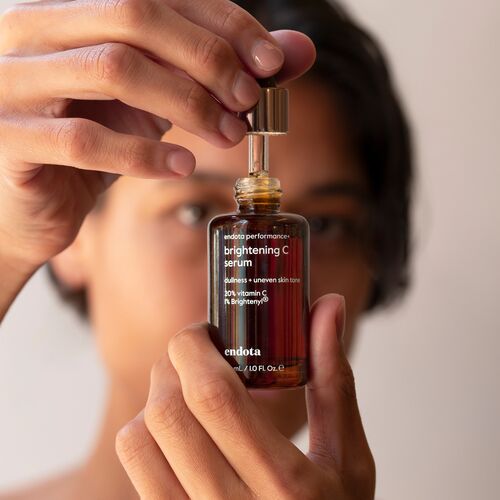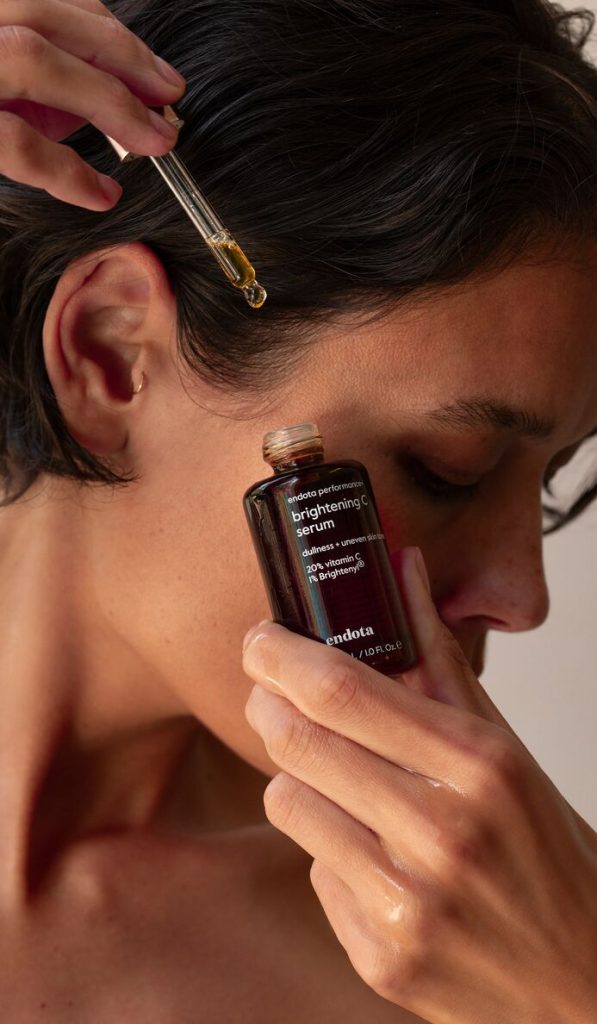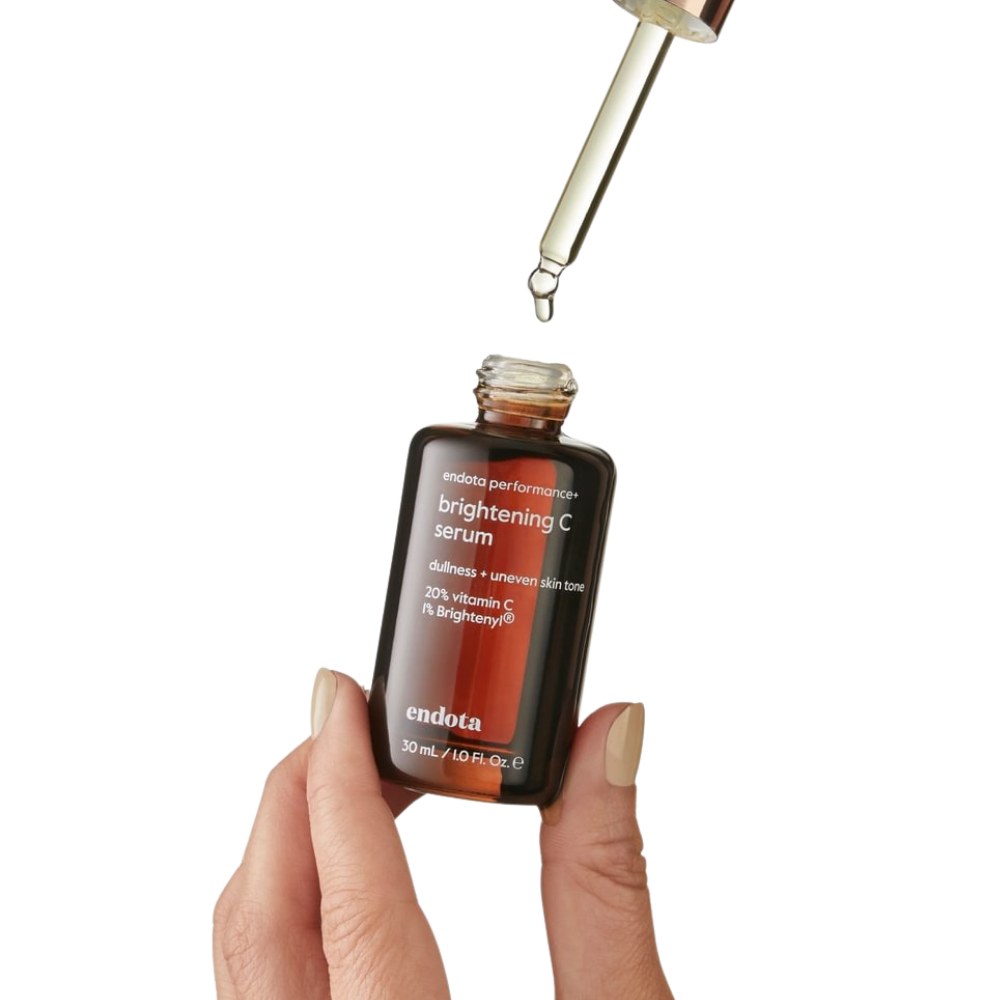Vitamin C serums have become a staple in skincare routines around the world – and for good reason. Lightweight yet powerful, serums deliver a high concentration of nourishing active ingredients designed to support healthier, brighter, and more resilient skin. When applied topically, vitamin C works hard behind the scenes to support collagen production, fade pigmentation, and protect against environmental stressors.¹
Whether you’re targeting dullness, uneven skin tone, or the first signs of ageing, a vitamin C serum could be the glow-boosting essential your ritual’s been missing.
For example, our Brightening C Serum, formulated with 20% vitamin C and 1% Brightenyl® for visible radiance, has shown impressive results in clinical trials:
- Reduces visibility of pigmentation by 42% when used once daily for 8 weeks.
- Supports the skin barrier by reducing transepidermal water loss (TEWL) by 21%, helping skin retain moisture and resist dehydration.

Vitamin C serums have become a staple in skincare routines around the world – and for good reason. Lightweight yet powerful, serums deliver a high concentration of nourishing active ingredients designed to support healthier, brighter, and more resilient skin. When applied topically, vitamin C works hard behind the scenes to support collagen production, fade pigmentation, and protect against environmental stressors.¹
Whether you’re targeting dullness, uneven skin tone, or the first signs of ageing, a vitamin C serum could be the glow-boosting essential your ritual’s been missing.
For example, our Brightening C Serum, formulated with 20% vitamin C and 1% Brightenyl® for visible radiance, has shown impressive results in clinical trials:
- Reduces visibility of pigmentation by 42% when used once daily for 8 weeks.
- Supports the skin barrier by reducing transepidermal water loss (TEWL) by 21%, helping skin retain moisture and resist dehydration.
advantages of vitamin c serums
- Brightens and evens skin tone
Vitamin C inhibits melanin production, helping to reduce dark spots and hyperpigmentation. This promotes a more even complexion and natural radiance.² - Reduces the appearance of fine lines and wrinkles
Vitamin C supports natural collagen production, which helps to firm the skin and reduce the appearance of fine lines. Its antioxidant effect also helps prevent collagen breakdown.³ - Protects against environmental damage
As a potent antioxidant, vitamin C neutralises free radicals caused by UV exposure and pollution, helping to protect skin from premature ageing.⁴ It’s best to apply vitamin C serum in the morning to maximise protection. - Supports collagen synthesis
Vitamin C is essential for collagen biosynthesis and stabilises collagen molecules, promoting firmer, more elastic skin.⁵ - Enhances skin barrier function
Research shows vitamin C can support lipid production in the skin, strengthening the barrier and helping skin retain moisture.⁶ - Combats dullness
By increasing skin turnover and reducing oxidative stress, vitamin C helps skin appear fresher and more luminous. Glycolic acid can bring on even more brightness when used in separate routines.⁷ - Boosts the effects of sunscreen
Vitamin C enhances the efficacy of sunscreen by fighting oxidative damage. Please note that it doesn’t replace SPF, vitamin C simply complements your sun protection routine.⁸ - Helps with acne scarring
Its anti-inflammatory properties and role in collagen production⁹ make vitamin C useful in reducing the appearance of scars over time. For active breakouts and acne, our Clearing BHA Serum works to address this congestion. - Encourages smoother skin texture
By boosting collagen and supporting cell renewal, vitamin C improves skin texture and smoothness over time. - Works well with other actives
Vitamin C can be combined with niacinamide and hyaluronic acid for an extra-nourishing, hydrating, and brightening routine. Just avoid layering with strong actives like retinal or retinol in the same session. Try using our Plumping Hyaluronic Serum to support hydration alongside your brightening routine.
how to use a vitamin c serum
- Apply to clean, dry (or slightly damp) skin after cleansing.
- Use as directed. For our Brightening C Serum, gently pat into skin.
- Use in the morning to protect against environmental stressors.
- Follow with moisturiser and broad-spectrum SPF 50+.
- Store in a cool, dark place to prevent oxidation.
- When first using the serum, start with 2-3 times per week to build skin’s tolerance, working up to daily use.
- Do not layer with retinoids or AHAs in the same routine.
- Discontinue use if persistent irritation occurs.
things to consider before using vitamin c serums
While vitamin C is generally well tolerated, some users may experience:
- Mild stinging or redness, especially if new to actives.
- Breakouts or purging, particularly when paired with other exfoliants.
- Increased skin sensitivity.
If you have sensitive or reactive skin, consider patch testing first. Products like our De-Stress Serum, which contains 2% niacinamide and SymRelief®100, are also ideal for calming irritation and supporting a more sensitive skin barrier.
Always consult with your skin therapist or GP if you have ongoing skin conditions.

how to use a vitamin c serum
- Apply to clean, dry (or slightly damp) skin after cleansing.
- Use as directed. For our Brightening C Serum, gently pat into skin.
- Use in the morning to protect against environmental stressors.
- Follow with moisturiser and broad-spectrum SPF 50+.
- Store in a cool, dark place to prevent oxidation.
- When first using the serum, start with 2-3 times per week to build skin’s tolerance, working up to daily use.
- Do not layer with retinoids or AHAs in the same routine.
- Discontinue use if persistent irritation occurs.

things to consider before using vitamin c serums
While vitamin C is generally well tolerated, some users may experience:
- Mild stinging or redness, especially if new to actives.
- Breakouts or purging, particularly when paired with other exfoliants.
- Increased skin sensitivity.
If you have sensitive or reactive skin, consider patch testing first. Products like our De-Stress Serum, which contains 2% niacinamide and SymRelief®100, are also ideal for calming irritation and supporting a more sensitive skin barrier.
Always consult with your skin therapist or GP if you have ongoing skin conditions.
vitamin c serum benefits faqs
what does vitamin C serum actually do for your skin?
There are so many vitamin C serum advantages for your skin. It helps to brighten skin, support collagen production, protect against environmental stressors, and reduce pigmentation.
can I use vitamin C serum every day?
Yes. It’s gentle enough for daily use. We recommend using Brightening C Serum in the morning and avoiding strong actives like retinal in the same routine. Use Renewal A Serum or Overnight Glow Treatment in the evening.
when should I apply vitamin C serum in my routine?
You’ll experience the most benefits from vitamin C serum in the morning, after cleansing but before moisturising and applying sunscreen.
what skin type is vitamin C serum suitable for?
Vitamin C is suitable for most skin types, including dry, normal, and combination. Sensitive skin should start slowly, using the serum a few times per week initially to monitor for any reactions, before increasing to daily use.
can vitamin C serum cause breakouts or irritation?
Sometimes, especially for those with very sensitive or acne-prone skin. Introduce gradually and monitor how your skin responds.
does vitamin C serum help with acne or acne scars?
Yes, it can help support healing, fade dark marks, and calm inflammation. Use alongside Clearing BHA Serum for clearer skin.
how long does it take to see results from a vitamin C serum?
Some improvements may be noticeable within 2–4 weeks, with more obvious results becoming clear over 6–12 weeks with consistent use.
glow with intention, one drop at a time
Integrating vitamin C into your skincare ritual is a simple way to support your skin’s natural vitality. It’s one of the many mindful choices that can help you feel more confident in your own skin. For personalised guidance, your endota skin therapist can help you find the skincare best suited to your complexion.
disclaimer
This content has been informed by peer-reviewed research and reviewed for accuracy. It does not replace personalised medical advice.
discover brightening c serum
Designed to visibly brighten, smooth, and even out skin tone. This formula helps you achieve your glowiest, most luminous skin yet.

sources
¹Al-Niaimi, F., & Chiang, N. Y. Z. (2017, July 1). Topical Vitamin C and the skin: Mechanisms of action and clinical applications. Journal of Clinical and Aesthetic Dermatology, 10(7), 14–17. Retrieved from: https://www.ncbi.nlm.nih.gov/pmc/articles/PMC5605218/
²Al-Niaimi, F., & Chiang, N. Y. Z. (2017, July 1). Topical Vitamin C and the skin: Mechanisms of action and clinical applications. Journal of Clinical and Aesthetic Dermatology, 10(7), 14–17. Retrieved from: https://www.ncbi.nlm.nih.gov/pmc/articles/PMC5605218/
³Al-Niaimi, F., & Chiang, N. Y. Z. (2017, July 1). Topical Vitamin C and the skin: Mechanisms of action and clinical applications. Journal of Clinical and Aesthetic Dermatology, 10(7), 14–17. Retrieved from: https://www.ncbi.nlm.nih.gov/pmc/articles/PMC5605218/
⁴Al-Niaimi, F., & Chiang, N. Y. Z. (2017, July 1). Topical Vitamin C and the skin: Mechanisms of action and clinical applications. Journal of Clinical and Aesthetic Dermatology, 10(7), 14–17. Retrieved from: https://www.ncbi.nlm.nih.gov/pmc/articles/PMC5605218/
⁵Al-Niaimi, F., & Chiang, N. Y. Z. (2017, July 1). Topical Vitamin C and the skin: Mechanisms of action and clinical applications. Journal of Clinical and Aesthetic Dermatology, 10(7), 14–17. Retrieved from: https://www.ncbi.nlm.nih.gov/pmc/articles/PMC5605218/
⁶Pullar, J. M., Carr, A. C., & Vissers, M. C. (2017). The Roles of Vitamin C in Skin Health. Nutrients, 9(8), 866. Retrieved from: https://pmc.ncbi.nlm.nih.gov/articles/PMC5579659/
⁷Houshmand, E. B. (2021, March). Effect of glycolic acid, phytic acid, soothing complex containing emulsion on hyperpigmentation and skin luminosity: A clinical evaluation. Journal of Cosmetic Dermatology, 20(3), 776–780. https://doi.org/10.1111/jocd.13950
⁸Al-Niaimi, F., & Chiang, N. Y. Z. (2017, July 1). Topical Vitamin C and the skin: Mechanisms of action and clinical applications. Journal of Clinical and Aesthetic Dermatology, 10(7), 14–17. Retrieved from: https://www.ncbi.nlm.nih.gov/pmc/articles/PMC5605218/
⁹Al-Niaimi, F., & Chiang, N. Y. Z. (2017, July 1). Topical Vitamin C and the skin: Mechanisms of action and clinical applications. Journal of Clinical and Aesthetic Dermatology, 10(7), 14–17. Retrieved from: https://www.ncbi.nlm.nih.gov/pmc/articles/PMC5605218/

